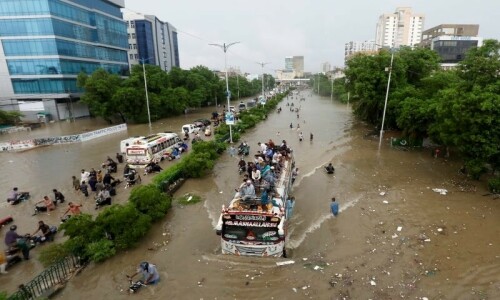KARACHI: Almost half of Karachi’s population is forced to purchase water for their daily use from different sources as “the gap in water supply and demand in the city is 50 per cent”, it emerged during the Sindh Assembly session on Wednesday.
The current state of the water crisis in the metropolis was highlighted when Sindh Local Government Minister Saeed Ghani briefed the house about the grim situation, but at the same time, the minister shared initiatives being planned by the Pakistan Peoples’ Party government in order to improve the situation.
Responding to a call attention notice given by Muttahida Qaumi Movement-P (MQM-P) member Rehan Akram, the Sindh minister came up with data and statistics which revealed the water supply situation in the city.
The minister said that if the “six legal hydrants” had not been operating, “there would be a huge water crisis” in the city.
Akram, an MPA from Karachi’s Central constituency (PS-121), which is facing a severe water supply crisis for the past several months, raised the question about the water problems.
The MPA said it was interesting to note that hydrants, which were operating within the same affected areas, were not facing any supply issue.
Ghani informed the house that six legal water hydrants were operating in the city in line with the apex court’s directives and shutting down them would mean that several areas in Karachi would go dry.
“But let me tell you that the Sindh government is spending money out of its annual development programme to restore water supply from the Hub Dam canal,” he said.
“The development work will be completed in the next 12 months to ensure 150 million gallons of water supply daily to the city. The water shortage increases in the summer due to higher consumption.
“Then power supply issue also affects the water supply. The Central district localities, mentioned in the call attention notice, receive water from the bulk supply source of Hub Dam.”
He said that Karachi receives 70 million gallons per day (MGD) of water from the Hub Dam source against its quota of 100 MGD. The public-private partnership mode of development had been adopted to carry out development work to restore the Hub Dam canal and supply to the affected areas in the city would improve after the completion of this project.
Earlier, Sindh Education Minister Syed Sardar Ali Shah informed the house that there were 14,000 primary schools across the province which did not have basic facility of water. “Similarly, 38 of them in Karachi are operating without washrooms.”
Replying to questions relating to the education department, the PPP minister sounded helpless when he explained how his ministry’s efforts to energise schools in rural Sindh with solar power to address the electricity supply issues were not meeting the desired results.
“We install solar panels in schools, but they get stolen after a few days,” he replied to one of the questions.
“The ills which have affected the society have obviously hit the education department as well, but we need to work together on this particular matter without going into political debate because it’s a matter of our children and our future. We have boosted our efforts and the project is going to equip all schools with water supply, washrooms and boundary walls.”
He also informed the legislators about technology-based solutions to ensure regular classes, regular presence of teaching staff at schools and monitoring of their performances. The technology including an app designed on modern lines will start functioning with the start of the new academic year, he added.
The house also passed the Gorakh Hills Development Authority (Amendment) Act which appoints the tourism minister as head of the authority.
The session was adjourned till Friday when Chief Minister Syed Murad Ali Shah will present the budget for the next fiscal year.
Published in Dawn, June 13th, 2024













































Dear visitor, the comments section is undergoing an overhaul and will return soon.